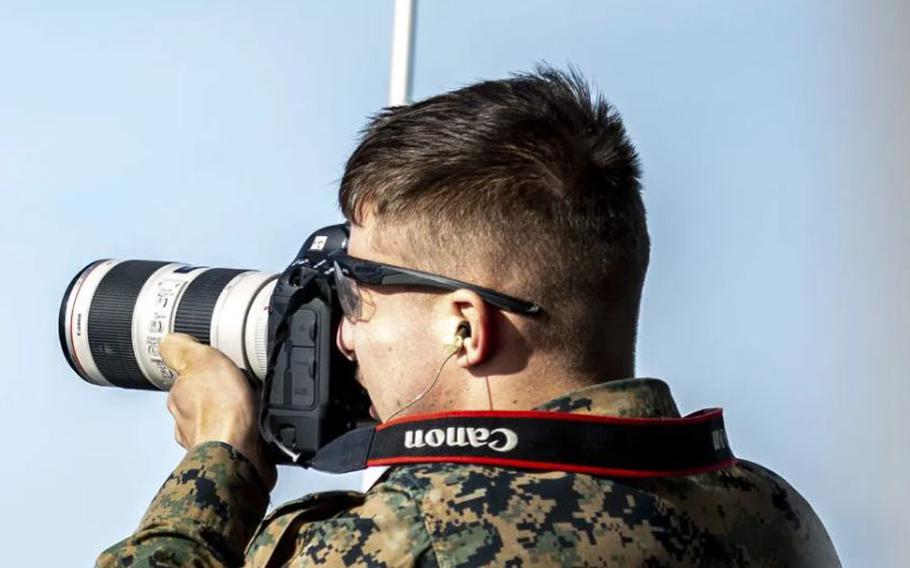Opinion
To help properly inform, infuse modern journalism with more military veterans
Special to Stars and Stripes February 2, 2023
You’ve probably heard about George Santos, the newly elected U.S. representative for New York’s 3rd Congressional District, who admitted to lying on the campaign trail about his background and qualifications for office. But when did you learn about it? And from what news outlet?
Months before this story became national news, a scrappy, hyper-local newspaper was raising serious questions about Santos’ purported background. Unfortunately, the North Shore Leader’s coverage was ignored by larger organizations, and this news did not reach many voters until after the election.
This saga shows how the strength of our free press, our news consumption habits, and our democracy are tightly intertwined. It also demonstrates the importance of local journalism: We can’t rely solely on national news organizations to thoroughly vet local candidates in every race across the nation. Research shows that robust local journalism improves voter participation and results in better government and better decisions made by elected officials. But community news outlets have been decimated in the online era, leaving coverage gaps that allow those in positions of power to evade accountability.
We need to examine our own responsibilities as news consumers — and informed citizens. When evaluating candidates, many voters rarely go deeper than party affiliation. This is where news literacy skills come in. With this week being National News Literacy Week, we must prioritize getting credible news and information from multiple sources and breaking out of our filter bubbles, with an emphasis on local news organizations, to become fully informed citizens.
Unfortunately, public confidence in the media is at an all-time low. One reason for skepticism is that misinformation and disinformation are rapidly filling local news vacuums. Previous generations didn’t have to work as hard to determine if the news they were consuming was factual — or actually even journalism.
Before the internet, there were limited ways to get news — primarily print, radio and TV, and nearly every community had at least one local news organization. We trusted these gatekeepers because they were the professionals, and there were only so many sources reporting on the events of the day. The downside, however, was that there were significant gaps in coverage, especially issues important to marginalized communities.
Today we have access to news and information from around the world and can learn about events from an incredible array of sources publishing across multiple formats. As empowering as that can be, it can be hard to know what to trust. Political commentary and news reporting often overlap, and we see everything from partisan blogs, satirical “news,” podcasts, citizen journalists and even bad-faith actors propagating false and misleading information.
We are bombarded by information that, depending on the source, seeks to inform, persuade, or even manipulate us. The ability to find fact-based information from credible sources and use it to make our own decisions is now a critical skill for responsible and empowered citizenship.
There are still professionals out there: journalists and news organizations holding themselves to the highest ethical standards reporting the news fairly and accurately and correcting themselves when they make a mistake in reporting the facts. Several thousand military veterans continue to serve our democracy and our nation by working as journalists. Newsrooms would be smart to take advantage of their dedication to service and the trust that veterans bring with them.
Unfortunately, veterans are vastly underrepresented among the ranks of America’s journalists. While more than 7% of Americans have served in the armed forces, just 2% of journalists are vets. Hiring more military veterans can go a long way in improving trust in the media and ensuring a news industry that represents our nation.
Santos’ story is a lesson: Holding our elected officials accountable depends, in part, on our free press and the hard-working journalists who search for, analyze, verify and report critical information. It also hinges on the willingness of most of us — Democrats, Republicans and independents — to trust that reporting and do our part to ensure we have the news literacy skills necessary to seek out credible sources.
There’s a reason freedom of the press is enshrined in the First Amendment of the U.S. Constitution. The nation’s founders knew that citizens need to be well-informed for democracy to work.
Christa Sperling is an Air Force veteran and co-founder and board member of We the Veterans. John Silva is a Marine Corps veteran and senior director at the News Literacy Project. Zack Baddorf is a Navy veteran and executive director of Military Veterans in Journalism. To learn more about News Literacy Week visit newslit.org.

Several thousand military veterans continue to serve our democracy and our nation by working as journalists. Newsrooms would be smart to take advantage of their dedication to service and the trust that veterans bring with them. (Military Veterans in Journalism)